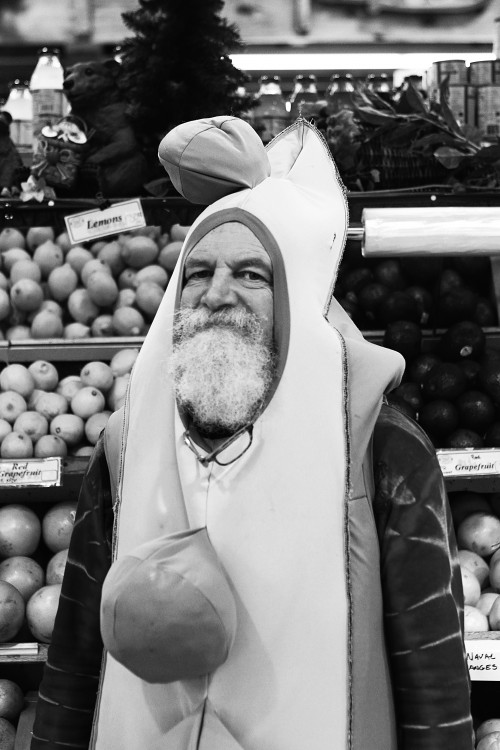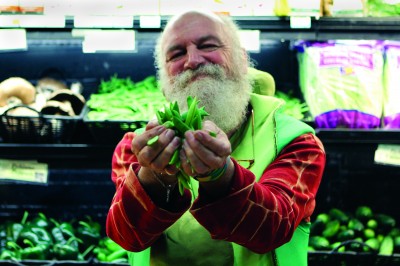On a Saturday evening in late June, a man dressed in fluorescent tie-dye presses his thumbs together and curls over his fingers to form a flying heart. The Carolina Chocolate Drops are playing “Cornbread and Butterbeans” to sunburned picnickers who skip and swing feverishly on the New Haven Green. Eric Triffin, with his tightly sprung coils, a receded hairline, and full white beard, dances alone to the left of the stage. He wears a tie-dye T-shirt featuring a giant pink heart that cushions the rainbow peace sign strung around his neck. His dance moves are varied and interpretive, sometimes vaguely yogi-esque— he balances unsteadily on one leg and swims through the air; he runs frantically in place with limbs flying in all directions and he whirls around in a dizzy trance — but what he called his “visual applause” never falls short of euphoric. Eyes closed, smile bursting, he is a display so uninhibitedly outlandish — seemingly delirious, even — that I wonder if the high of summertime music can fully account for it.
To New Haven locals, Triffin, also known as “Trippin’ Triffin,” “Eric the TranscendDancer,” or simply “Carrotman,” West Haven Public Health employee for nearly twenty-four years, is a celebrated local fixture. His infectious presence and psychedelic performances have been visible at local festivals and live-band performances for decades — including, as Triffin claims, over five hundred Mondays of Rohn Lawrence’s “Smooth Jazz” at Lilly’s Pad. He’s been known to make appearances in everything from a giant carrot costume to — as Toad’s bartender Aspen Powers confirms — full-body electroluminescent wiring that can strobe in beat.
There’s no doubt that Triffin’s seemingly unhinged image can initially be perplexing. “From a distance,” Richard Borer, West Haven’s former mayor, tells me, ”it’s easy to think he’s some burned-out hippie walking down Chapel Street.” Indeed, “hippie” is a title that Triffin himself fully embraces. In a voice full of whimsy, he tells me that his heart has felt the affirmation of the love generation at Woodstock.
Perhaps nothing is more perplexing than attempting to reconcile this image with Triffin’s professional career. While Triffin claims that dancing is what he’s doing when he feels most alive, he knows what it means to “bring home the tofu.” Triffin started at worked West Haven Public Health as Health Educator from 1986-1990 and then became the city’s Public Health Director until 2010.
Triffin, who received his MPH from Yale School of Public Health in 1984, has secured West Haven hundreds of thousands of dollars in state and federal grants for everything from a “Childhood Immunization Registry and Tracking System” to “Bio-terrorism and Emergency Response Preparation.” He implemented West Haven’s lead poisoning and childhood immunization programs, as well as initiatives to lower infant mortality in the area. He’s written at least nine opinion pieces and letters to the editor in the New Haven Register over the years, as well innovative public health essays such as: “Food-a-Go-Go School Cafeterias: State of the Art Centers for Excellence in Nutrition and Hygiene.”
On their 350th anniversary, Yale School of Public Health awarded him a place on the Public Health Community Service Honor Roll. New England Division of the American Cancer Society has recognized him as “one of the most influential persons in the fight against tobacco during the last 25 years.” To top it all off, he’s fluent in three languages — French, English and Italian — and has a foothold in Spanish, Russian, and Sanskrit.

It’s an impressive resume, one that reflects what Robert Kilpatrick ventured to call Triffin’s “anything but disconnected” style. According to Kilpatrick, who worked for over thirty-five years with the Cornell Scott Hill-Health Center, it was this holistic approach to public health that brought Triffin to bat for the center when they struggled to open a branch in downtown West Haven back in 1995. A number of city council members were resisting Hill-Health’s proposal. “There was all this concern that there would be drug addicts lined up at the clinic door, causing a nuisance in the neighborhood,” Kilpatrick tells me.
As West Haven’s liaison with Hill-Health and a staunch advocate of the clinic, Triffin was appalled. When he spoke about it, his voice lost its usual whimsy and his eyes narrowed. “It was unfathomable. These were sick people who needed healthcare.” Triffin ultimately wrote successfully applied to have West Haven identified as a medically underserved area; a high-need, low-income designation that helped garner the funding and recognized urgency for Hill-Health to set up a clinic on Main Street.
Triffin’s work has not lacked for style; Borer has called it the “Triffin School of Public Health.” Chuckling fondly, Borer recalled Triffin started doing outreach from a Volkswagen bus. A card-carrying vegan, Triffin began driving to local festivals, farmers markets and exhibitions in the bus, where he would don his “Carrotman” or “Snappy the Peace Pod” costumes to promote healthy living. It’s a tradition he eventually brought to the West Haven Green when he started their first farmer’s market, and one he continues to this day. “May peas be with you, may peas be with you,” he beams, almost manically, as he hands out snap peas to passersby. “Now you may have peas within,” he says, and then, swirling around, ”You too can create whirled peas.” He ends with one final addendum, which he delivers with a hint of self-satisfaction: “But I’m just a hip-pea.”
Kilpatrick remembers Triffin in the midst of an ultimately successful campaign to ban smoking in public places in the state of Connecticut. “I was at the capital in Hartford at this conference, and when Triffin’s turn to make a statement came, he went up and burst into song.” He laughs. “He had changed the words of…I’m pretty sure it was ‘Who let the dogs out?’” Triffin’s approach offered a proactive and creative influence against a material culture in which, Triffin argues, “We’re infecting kids with bad [choices]. Advertising is a vector for chronic disease.”
According to Borer, Triffin’s was a user-friendly approach that got people’s attention in a way not only that they would remember, but also that would work. “Eric’s very wise,” he tells me. “He’s the type of person who could communicate anything to just about anybody, whether it was some high-ranking official from the state of Connecticut or the federal government or it was a single mom on the streets who needed assistance.” I can confirm this — Triffin, very effectively, explained the digestive system to me by starting with the assertion that a person is a lot like a donut.
As Borer puts that approach, “it wasn’t ivy-tower stuffy intellect, but a very down-to-earth, folksy, ‘this is how we’re going to get people healthy’ form of innovative brilliance.” And, he added, the nation should use this grounded innovation in the burgeoning field of public health. He recalls an old mantra of Triffin’s: “it’s more of what’s happening between your hands that will hurt you more than anything else that’s going on in the world.
When Triffin reflects on his unconventional approach to the role of Public Health Director, the deliberative nature of his genius shines through. “I may look like a fish out of water,” he admits, “but I’m more like a Shakespearean fool.”
– –
I meet with Triffin on a chilly October afternoon at Edge of the Woods, a vegetarian health food market on Whalley Avenue where he does twice-weekly food demonstrations — on this particular day he’s making hot malt cider. After a quick lap around the store, I spot him at the end of the gluten-free aisle with a fresh tray. It’s a natural fit for Triffin, who got his start in nutrition — in the 70s, he started New Haven’s first food co-op and a vegetarian restaurant with his brother Kerry called “Down to Earth.” For him, the appeal of the store has a lot to do with freedom — “freedom from mega food corporations, freedom from killing animals, freedom from packaging, labeling, advertising, and preservatives…” He does a little jig as he explains to a shopper (miraculously without a spill). “Why not live lighter, closer to the sun, and with less of a footprint?”
Graphic design student Benjamin Niznik MFA ’14 catches up to Triffin just before I do. “Eric! I’m doing this project and I want you to participate.” He peels a softball-sized orange sticker off a sheet and asks Triffin to wear it. “The project is all about health and positive energy,” he explains to me later. “That’s Eric, in essence. The oranges are the equivalent of a virtual liking system in reality.”
Later, Triffin and I sit in the bakery café, sipping cider while he reflects on nearly six decades in New Haven. His narrative unfolds tangent by tangent, never lacking in intrigue or personal charm. With the exception of first grade in Paris and sixth grade in Rome, Triffin grew up in New Haven, graduating from Hopkins in 1969 — the same year he attended “3 Days of Peace & Music” at Woodstock for the first time. His was a large, liberal family. “I think I was 5 or 6 years old, building fall out shelters,” Triffin recalls, his blue eyes lit up as he ventures back into his memory. “My mother was teaching yoga to paraplegics in a cool atelier in Paris in the 40s, and feeding us carrot juice and wheat germ and growing sprouts in the 50s and 60s. She was sort of on the spiritual side.”
Triffin’s father, meanwhile, was Belgian economist and Yale professor Robert Triffin, who first proposed implementing a common currency to unite Europe. “My father was a monk in economist’s clothing,” Eric laughs. “He always said ‘unity creates peace.’ He dissolved borders that had been fought over for hundreds of years.”
Triffin recalls dinner table debates in his household where The New York Times was always on the kitchen table. “My mother was kind of on one side — very touchy, softy — and my father was on the other — more organized and theoretical.” The discussions drove Triffin to seek out a middle ground, much like the one his career in public health seemed to epitomize.
His story is interrupted when a woman slides a business card across our table as she exits the café. On the back, she’s written a note asking Triffin to call her about speaking for a Sierra Bridge Club event to protest a coal plant in Bridgeport. A few minutes later, another graphic design student approaches, asking Triffin to discuss MSG for a film she’s making. “You’re the third student to hit on me now,” Triffin jests. “Somebody else just gave me a card for a photography gig!” In September, Triffin made his music video debut in Tori Amos’ “Flavor” video. Triffin-fever is rampant.
– – –

“I ended up in Public Health,” Triffin levels, “because it was public and healthy, and not about working for the man.”
Triffin’s life philosophy is one of wellness and community; decidedly nurturing of freedom, knowledge, and love — not necessarily convention. “I’m all about cooking two casseroles in one oven, not killing two birds with one stone,” he tells me. It’s a simple and honest philosophy that seems to perfectly reconcile “Eric the TranscenDancer” with Eric the Health Director.
Given Triffin’s pacifism — he’s gone so far as to excise all “violent” language from his vocabulary — he was frustrated by what he perceived to be a “militaristic” shift in the field of public health after 9/11, marking a turning point in his career. As the wars in Afghanistan and Iraq gave rise to concerns of bioterrorism, the pro-wellness, grassroots initiatives that had long characterized Triffin’s work were sidelined. “There would be powdered sugar on the street…and all of the sudden Eric would have to be dealing with anthrax,” Borer recounts. When I ask Triffin about this, he groans as he reminisces on “the absurd idea that Saddam would be infecting us with smallpox.” The Public Health Director’s job description seemed to include new defense initiatives, like establishing a position of Homeland Security Coordinator for West Haven and leading emergency preparedness exercises in the community.
Triffin became uncomfortable with the work, ultimately viewing it as an alarmist extension of a war effort he could not bring himself to support. His feeling was that the only effective way to disarm violence would be through promoting health. We should have been “exporting tractors…building wells and desalinization plants,” he explains.
Triffin’s disenchantment was evident to Borer, too. “I could always tell when Eric wasn’t buying something,” Borer tells me, “because he would suddenly get very quiet, purse his lips, and just sit there. That’s the closest thing to a negative reaction you’ll ever get out of Eric… I could tell he was frustrated.” Ultimately, the Director handed in his resignation to the Department of Public Health in 2010. There are certain fevers Triffin cannot pass on. After all, he explains, “when you show up at a bioterrorism conference dressed as a giant carrot, there are people that simply don’t approve.”
Nowadays, Triffin has put a new twist on his work, focusing mainly on outreach and “edutainment” as he continues his twenty-five year side career as an adjunct Professor of Public Health, Wellness and Nutrition at Southern Connecticut State University. “For twenty-five years I contained contagion,” he said, dancing along to his own words with hand gestures. “Now I’m trying to spread contagions of caring and infect people with good health. Good food, good music, good energy, good dancing, good friendships and good exercise.“ He is a self-proclaimed player and performer, a seeming vector of love and energy. He gushes over an encounter he had at this year’s Gathering of the Vibes. “Someone came up to me said, ‘I think of you every day. Seeing you be free to do what you love makes me be more free.’ And then she disappeared off into the crowd.”
– – –
My phone buzzes one evening in early December to a text message from Triffin. Earlier that day, I’d called Triffin to ask what his earliest childhood memory was, struggling to picture a time before his energy and his acute eye to the world. His response had been hesitant — uncharacteristically uncomfortable, even — but he’d told me that I’d caught him on his way back in from a hike. He set in on a beautiful description of young summers spent on a bean and peach farm in Tuscany.
In the text message, Triffin reveals to me his actual earliest memory; that of being in utero, in the “womb room.” Amid severe complications with her pregnancy, Triffin’s mother had been advised to abort by the chief obstetrician at the American Hospital in Paris. Instead, she heeded the word of a midwife, staying bedridden through the final months of her pregnancy.
“Throughout my youth, I would feel this sense of, like, three atmospheres weighing on me. It would come over me a couple of times a year, only when I was very relaxed, and stopped entirely when I was about twenty-eight. I could feel myself being breathed by an entity greater than myself, very protected and totally connected to everything around me.”
“I think it gave me a leg up in peacefulness, connectedness, and comfort with my environment,” he continues. “Perhaps my first dancing was in utero.”
It’s by far the strangest thing that Triffin has ever shared with me, and yet, I find it compellingly honest. Triffin’s self-conscious revelation is impossibly grounded, even in its visceral otherworldliness.
It reminds me of a comment he’d shared with me just that morning: “Someone once told me that I danced in order to pretend that gravity affects me.”
– – –
Whether he’s dancing with his feet or with his words, Triffin has a unique way of making sense of most things, revealing wisdom and truth to his audience just as Shakespeare’s fool does. But perhaps Triffin’s clearest moment is when he explains his own vibrant identity. “Viruses are embedded in the DNA, the very fabric, of all life,” he spells out with a smile. “They’re the motivators that push us to look outside ourselves and to share, to learn, to explore beyond convention. Aren’t we all simply looking to find a host and connect?”
There’s a lot than can get lost in the unorthodox image of Eric Triffin, but eventually, the beauty of his genuine substance sneaks up on you and forces you to think. My mind often flickers back to the festivities-infected New Haven Green, where I first met Triffin. As I laughed and speculated where he missed the turn to Woodstock, he asked me, “What are you doing when you feel most alive?”
I should have sensed the contagions then.


